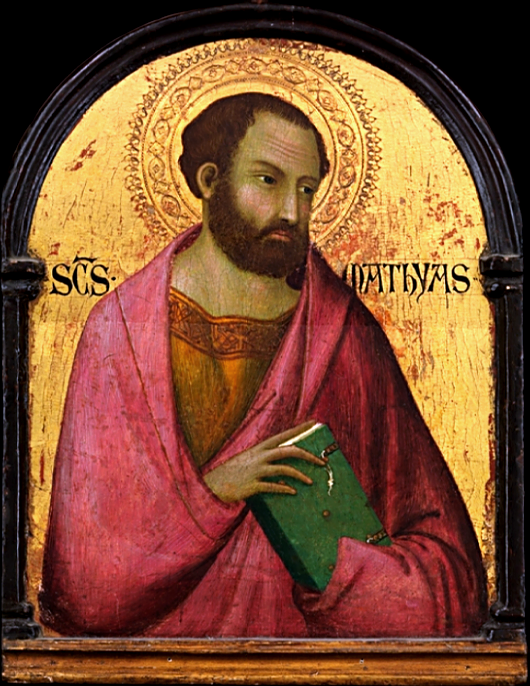As Christians we are called to be in the world, but not of the world. This world is simply somewhere we will reside for a short while. Our citizenship is in Heaven, our true home, where we long to spend eternity with God. One of the ways in which the Church lives out this other-worldliness is shown in the reading from the Acts of the Apostles.
After Jesus’ Ascension the disciples spend time together in prayer and fellowship. One of their first actions is to appoint a replacement for Judas Iscariot, so that the Eleven Apostles may become Twelve again. For Jews the number twelve is very significant and stands for wholeness and the completion of God’s purpose. There are twelve months in a year, and twelve tribes of Israel. It is important that the Apostles are restored to their proper number. So, out of all the 120 current followers of Jesus, Peter states that they need someone who has been with them from the beginning, to act as a witness to Jesus’ resurrection. Two candidates are put forward: Justus and Matthias. Peter then prays for guidance:
“You, Lord, who know the hearts of all, show which one of these two you have chosen to take the place in this ministry and apostleship from which Judas turned aside to go to his own place.” (Acts 1: 24-25)
The disciples do not decide for themselves, they leave the choice up to God. Through the random process of casting lots, God can show them whom He wants to be an apostle. This feels strange to us nowadays. We want to be in control. We want to choose. Perhaps we would be better served by putting God back in control.
The Gospel reading continues exploration of the Farewell Discourses between the Last Supper and Jesus’ Arrest. Today we have arrived at Chapter 17, Jesus’ High Priestly Prayer. This is a truly solemn moment of intimate conversation between the Father and the Son. Before His Passion, Christ is entrusting His Church to the Father, that it may be kept safe, and that it may be filled with the glory of God, and strengthened to proclaim the Good News of the Kingdom. It is a moment of profound emotion and intimacy, a window into the conversation between two Persons of the Holy Trinity.
Jesus is entrusting us, His Church to God, for God to care for us. His prayer sees us in opposition to a world which rebels against God, a world of sin and corruption, a world of power and politics. Christ prays that His people may be set apart, holy, devoted to God, and filled with love. To love is to will the good of the other. God loves us, and it is God’s will that we flourish and enjoy life in all its fulness, united to Him. This is why Jesus taught us to pray,
“Thy kingdom come, thy will be done, on earth as it is in heaven.” (Mt 6:10)
Christ is praying that we, His Church, stay close to God, and be united with God’s will, filled with God’s love. This is why we look forward to next Sunday, when we celebrate Pentecost, the outpouring of the Holy Spirit. This is a sign of God’s love for us, the love which unites Father, Son and Holy Spirit. God invites us to be united with the life of the Trinity, and to offer that invitation with others. If we place ourselves in God’s hands He will take the initiative, just as He did in choosing Matthias to replace Judas.
Matthias’ name means ‘gift of God’. The disciples received this gift after praying together and asking for God’s guidance. As Christians we too need to be together, to meet together to pray for our needs and those of the world. In prayer, we are united with each other and with God. Sharing in the Eucharist together and hearing the word of God nourishes us. They are crucial to who and what we are. Together we experience the love of God and the joy of community. The world may be indifferent to what we do, or it may call us hypocrites when we fail to live up to the example of Jesus. But, as Christians, we strive to live in the love of God, and forgive each other our trespasses, so that we can live out that same radical love and forgiveness which sees Jesus die upon the Cross for love of us and all the world.
It is a message of such love, such forgiveness that the world cannot or does not want to understand. We may not understand God’s love, but we know that it can be experienced, through personal encounter with Jesus. We are living testimony to love’s power to change lives. It sets us free to live for God and to proclaim his saving truth in our words and actions.
As I mentioned earlier in this sermon, Matthias’ name means ‘gift of God’ and his appointment comes just before God’s wonderful gift of the Holy Spirit. So as we wait with the Apostles for this gift, let us pray that God may be at work in us, building us up, and giving us strength to live the Christian life and to proclaim God’s truth. Let us then share these gifts with others, so that they may also come to believe and give glory to God the Father, God the Son, and God the Holy Spirit. To whom be ascribed, as is most right and just, all might, majesty, glory, dominion, and power, now and forever. Amen.

No comments:
Post a Comment